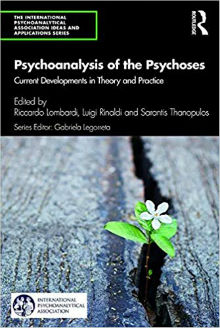
Novità editoriali
Riccardo Lombardi, Luigi Rinaldi e Sarantis Thanopulos (a cura di) (2019), Psychoanalysis of the Psychoses - Current Developments in Theory and Practice
- Dettagli
- Categoria: Novità editoriali

Ed. Routledge New York, 2019
(Il libro è già stato pubblicato in Italiano, da Cortina, nel 2016, con il titolo Psicoanalisi delle Psicosi)
Contributi di: Mark Blechner, Stefano Calamandrei, Giuseppe Civitarese, Franco De Masi, Didier Houzel, John Kafka, Riccardo Lombardi, Giuseppe Martini, Luigi Rinaldi, Michael Robbins, Ira Steinman, Sarantis Thanopulos, Paul Williams.
“Rarely has a book dealt with the psychodynamics and analytic treatment of psychotic patients with the breadth and scholarship of this comprehensive volume. I enthusiastically recommend this wonderful book.”-Lawrence J. Brown, IPA Psychoanalyst, Boston, USA; author of Transformational Processes in Clinical Psychoanalysis: Dreaming, Emotions, and the Present Moment.
“The psychoanalytic research on unrepresented (psycho-somatic, autistic or autistoid etc) and psychotic states has an increasingly and important impact on the current psychoanalysis. Reading this book is a touching experience, discovering how psychotic patients can be open to psychoanalysis, so that holding and containing processes can occur.”-Bernd Nissen, IPA Training and Supervising Analyst, Editor of Jahrbuch der Psychoanalyse
Psychoanalysis of the Psychoses brings together a distinguished international set of contributors, offering a range of views and approaches, to explore the latest thinking in the psychoanalytic treatment of psychosis and related disorders. Drawing on findings from neuroscience, theory and clinical material from many schools of psychoanalytic thought, this book offers a comprehensive guide to understanding how psychosis is conceptualised from a psychoanalytic perspective. It looks at how to work with psychotic patients, typical problems in treating psychosis and the role of pharmacology. It demonstrates the relational dimension, capable of strengthening the patient’s observing Ego and facilitating the integration of the different areas of the personality. This process can identify and work through the main psychological stress factors involved in psychotic disturbances, transforming chaotic thoughts into springboards for important insights, and offering patients the precious chance to construct for the first time a creative relationship with their own existence. Psychoanalysis of the Psychoses will be of great interest to psychoanalysts and psychoanalytic psychotherapists as well as psychiatrists wishing to draw upon psychoanalytic ideas in their work.
Riccardo Lombardi, MD, is a Psychoanalyst and Psychiatrist. He maintains a full-time private practice in Rome, Italy, and teaches at the Roman Psychoanalytic Institute of the International Psychoanalytic Association (IPA). He is also a Training and Supervising Analyst of the Italian Psychoanalytic Society.
Luigi Rinaldi is a Psychiatrist and Training Analyst, and Member of the Italian Psychoanalytic Society and IPA. He has been Head Psychiatrist and has taught in the University schools of specialization in Psychiatry and Clinical Psychology in Naples, Italy.
Sarantis Thanopulos is a Psychiatrist and Supervising and Training Analyst of the Italian Psychoanalytic Society and IPA, based in Naples, Italy.
Paola Marion (2017), Il disagio del desiderio. Sessualità e procreazione nel tempo delle biotecnologie. Editore Donzelli
- Dettagli
- Categoria: Novità editoriali

Editore Donzelli, 2017
Quale influenza hanno sugli individui le modificazioni introdotte dalle biotecnologie nel campo della procreazione e della generazione? In che modo queste innovazioni sono destinate a influenzare anche gli aspetti più profondi dell’identità personale, incidendo potentemente sul nostro rapporto con il corpo e con la sessualità? E come interferiscono con la sfera del desiderio, con l’idea stessa di piacere? Questo libro affronta, dall’angolatura della riflessione e della pratica psicoanalitica, un nodo di problemi che ci riguarda tutti e coinvolge le nostre dimensioni più intime. La sessualità, a cui sono strettamente legati piacere e dispiacere, è un elemento sempre presente nello sviluppo dell’individuo, cuore della sua identità. Non riflette solo la storia intima di ciascuno di noi ma risente anche di un tempo che ci precede, dal momento che l’origine di ciascuno affonda in un atto sessuale alle nostre spalle. Le nuove biotecnologie «espellono» il sesso dalla procreazione e rendono così possibile la generazione attraverso modalità che prescindono dall’atto sessuale. La disgiunzione tra sessualità e procreazione rappresenta una frattura che mette in discussione i due termini nell’ambito dell’individuo e della coppia. Si aprono così diversi problemi, sia per quanto riguarda la vicenda biografica e la molteplicità di luoghi e figure che possono abitare lo spazio fisico e temporale del concepimento, sia per quanto riguarda i termini del rapporto piacere-dispiacere e il modo in cui ne può venire influenzata la relazione inconscia con il bambino. Scritto con un linguaggio semplice e accessibile, questo libro affronta – come sottolinea la prefazione di Giuliano Amato – aspetti cruciali del rapporto tra tecnologia, etica pubblica e sfera privata, chiamando il lettore a interrogarsi su problemi inediti che riguardano la coppia, la generazione e la stessa identità del bambino.
Paola Marion è psicoanalista, membro ordinario con funzioni di training della Società Psicoanalitica Italiana e dell’International Psychoanalytic Association (Ipa). È anche analista di bambini e adolescenti. È stata chair dell’European Outreach Committee dell’Ipa. Attualmente è direttore della «Rivista di psicoanalisi». Le sue pubblicazioni sono apparse sull’«International Journal of Psychoanalysis», sulla «Rivista di psicoanalisi» e in libri collettanei.
Leggi la recensione di Laura Porzio Giusto
Vedi anche:
Altri articoli...
- Claudio Neri (2017), Gruppo. Raffaello Cortina Editore
- Carla Busato Barbaglio, Giovanni Meterangelis, Cristiana Pirrongelli (2017),, Luigi Solano. Anticipare il futuro: la psicoanalisi oggi
- Alberto Siracusano (2017), Risalire in Superficie. Conoscere e affrontare la depressione.
- Per una psicoanalisi nelle istituzioni. Pensare in gruppo (2016). AA.VV., con i contributi di Guelfo Margherita e Claudio Neri
- Paolo Boccara, Giuseppe Riefolo (2016), Al cinema dallo psicoanalista. Se il cinema è utile alla psicoanalisi
- Maria Adelaide Lupinacci, Daniele Biondo, Laura Accetti, Mirella Galeota, Adelia Lucattini (2015), Il dolore psichico e metodo psicoanalitico. Casa Editrice Astrolabio
- Alfredo Lombardozzi (2015), L’imperfezione dell’identità. Riflessioni tra psicoanalisi e antropologia. Alpes
- Stefano Beggiora, Mario Giampà, Alfredo Lombardozzi e Anthony Molino (2014), Sconfinamenti. Escursioni psico-antropologiche. Mimesis
- Centro di Psicoanalisi Romano (2012), Dissociazione Scissione Rimozione. Franco Angeli
- Alessandra Ginzburg (2011), Il miracolo dell'analogia. Saggi su letteratura e psicoanalisi. Pacini
